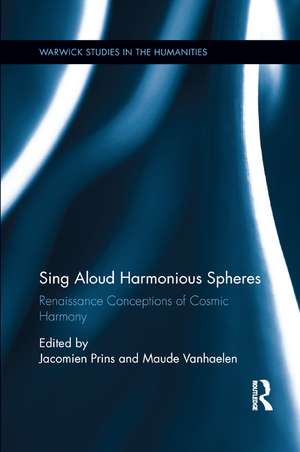Sing Aloud Harmonious Spheres: Renaissance Conceptions of Cosmic Harmony: Warwick Series in the Humanities
Editat de Jacomien Prins, Maude Vanhaelenen Limba Engleză Paperback – 10 dec 2019
| Toate formatele și edițiile | Preț | Express |
|---|---|---|
| Paperback (1) | 389.38 lei 43-57 zile | |
| Taylor & Francis – 10 dec 2019 | 389.38 lei 43-57 zile | |
| Hardback (1) | 766.24 lei 43-57 zile | |
| Taylor & Francis – 7 sep 2017 | 766.24 lei 43-57 zile |
Preț: 389.38 lei
Nou
Puncte Express: 584
Preț estimativ în valută:
74.51€ • 78.00$ • 61.65£
74.51€ • 78.00$ • 61.65£
Carte tipărită la comandă
Livrare economică 07-21 aprilie
Preluare comenzi: 021 569.72.76
Specificații
ISBN-13: 9780367888626
ISBN-10: 0367888629
Pagini: 306
Dimensiuni: 152 x 229 x 18 mm
Greutate: 0.45 kg
Ediția:1
Editura: Taylor & Francis
Colecția Routledge
Seria Warwick Series in the Humanities
Locul publicării:Oxford, United Kingdom
ISBN-10: 0367888629
Pagini: 306
Dimensiuni: 152 x 229 x 18 mm
Greutate: 0.45 kg
Ediția:1
Editura: Taylor & Francis
Colecția Routledge
Seria Warwick Series in the Humanities
Locul publicării:Oxford, United Kingdom
Public țintă
Postgraduate and UndergraduateCuprins
CONTENTS
Acknowledgements
List of illustrations
Introduction
Jacomien Prins and Maude Vanhaelen
Part I: Ancient and Medieval sources
1. Eight Singing Sirens: Heavenly Harmonies in Plato and the Neoplatonists
Francesco Pelosi
2. Latin and Arabic Ideas of Sympathetic Vibration as the Causes of Effects between Heaven and Earth
Charles Burnett
3. Theory of Cosmic Harmony in Jewish and Muslim Sources
Amnon Shiloah
4. Medieval Variations on a Cosmic Theme
Gabriela Currie
5. "Therout com so gret a noyse": The Harmony of the Spheres and Chaucerian Poetics
Wolfram Keller
Part II: The Revival of the Doctrine of the Pythagorean Harmony of the Universe in Fifteenth- and Sixteenth-century Italy and Germany
6. Cosmic Harmony, Demons, and the Mnemonic Power of Music in Renaissance Florence: The Case of Marsilio Ficino
Maude Vanhaelen
7. Francesco Giorgi on the Harmony of the Creation and the Catholic Censorship of His Views
Leen Spruit
8. Francesco Patrizi and the ‘Weakest Echo of the Harmony of the Spheres’
Jacomien Prins
9. The Reception of Ficino’s Theory of World Harmony in Germany
Grantley McDonald
Part III: The Tradition of the Harmony of the Spheres in Seventeenth- and Early Eighteenth-centuries Europe and New Spain
10. Cosmic Play in a Symbolic Harmonic Universe: The Reception of Cusanus and Kircher in Seventeenth-century New Spain
Linda Baez-Rubi
11. Andrea Torelli and His Orphic Lyre
Concetta Pennuto
12. The Harmony of the Spheres in English Musical Mathematics, 1650–1750
Benjamin Wardhaugh
13. William Stukeley’s ‘Music of the Spheres’ Man
Acknowledgements
List of illustrations
Introduction
Jacomien Prins and Maude Vanhaelen
Part I: Ancient and Medieval sources
1. Eight Singing Sirens: Heavenly Harmonies in Plato and the Neoplatonists
Francesco Pelosi
2. Latin and Arabic Ideas of Sympathetic Vibration as the Causes of Effects between Heaven and Earth
Charles Burnett
3. Theory of Cosmic Harmony in Jewish and Muslim Sources
Amnon Shiloah
4. Medieval Variations on a Cosmic Theme
Gabriela Currie
5. "Therout com so gret a noyse": The Harmony of the Spheres and Chaucerian Poetics
Wolfram Keller
Part II: The Revival of the Doctrine of the Pythagorean Harmony of the Universe in Fifteenth- and Sixteenth-century Italy and Germany
6. Cosmic Harmony, Demons, and the Mnemonic Power of Music in Renaissance Florence: The Case of Marsilio Ficino
Maude Vanhaelen
7. Francesco Giorgi on the Harmony of the Creation and the Catholic Censorship of His Views
Leen Spruit
8. Francesco Patrizi and the ‘Weakest Echo of the Harmony of the Spheres’
Jacomien Prins
9. The Reception of Ficino’s Theory of World Harmony in Germany
Grantley McDonald
Part III: The Tradition of the Harmony of the Spheres in Seventeenth- and Early Eighteenth-centuries Europe and New Spain
10. Cosmic Play in a Symbolic Harmonic Universe: The Reception of Cusanus and Kircher in Seventeenth-century New Spain
Linda Baez-Rubi
11. Andrea Torelli and His Orphic Lyre
Concetta Pennuto
12. The Harmony of the Spheres in English Musical Mathematics, 1650–1750
Benjamin Wardhaugh
13. William Stukeley’s ‘Music of the Spheres’ Man
Notă biografică
Jacomien Prins is a Global Research Fellow at the Institute of Advanced Studies (IAS) and the Centre for the Study of the Renaissance (CSR) of the University of Warwick. She has worked extensively on the interaction between music theory and philosophy in the Renaissance. Her work includes Harmonisch labyrint (Hilversum: Verloren, 2007), Echoes of an Invisible World: Marsilio Ficino and Francesco Patrizi on Cosmic Order and Music Theory (Leiden: Brill, 2014), and Marsilio Ficino: Commentary on the Timaeus (Cambridge, MA: Harvard University Press, forthcoming). She is currently working on a book, titled A well-tempered Life: Music, Health and Happiness in Renaissance Learning.
Maude Vanhaelen is Associate Professor in the Departments of Classics and Italian at the University of Warwick. She has published articles on the reception of Platonism in 15th and 16th century Italy. she is the author of Marsilio Ficino: Commentary on the Parmenides (Cambridge, MA: Harvard University Press, 2012).
Maude Vanhaelen is Associate Professor in the Departments of Classics and Italian at the University of Warwick. She has published articles on the reception of Platonism in 15th and 16th century Italy. she is the author of Marsilio Ficino: Commentary on the Parmenides (Cambridge, MA: Harvard University Press, 2012).
Descriere
This is the first volume to explore the reception of the Pythagorean doctrine of cosmic harmony within a variety of contexts, ranging chronologically from Plato to 18th-century England. This original collection of essays engages with contemporary debates concerning the relationship between music, philosophy, and science, and challenge
















